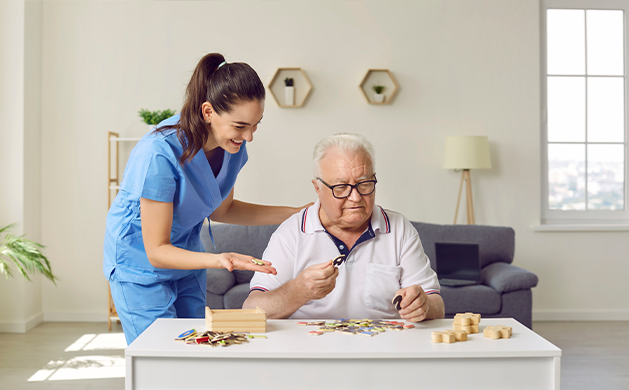This information guide is for people who care for family members or their loved ones with Alzheimer’s disease at home.
Alzheimer’s disease is an illness that causes changes in the brain. It interferes with the ability to think, remember, and use good judgment and to have difficulty taking care of themselves. As the disease progresses, Alzheimer’s patients will need more help. Sometimes taking care of individuals with Alzheimer’s makes you feel good because you are providing them with much-needed love and comfort. If you are caring for someone who is dealing with Alzheimer’s disease, your role in managing daily activities will increase as the disease progresses. Consider practical tips for caring for someone with Alzheimer’s, as these can help such people to participate as much as possible and allow you to manage tasks effectively.
The Alzheimer’s care journey
Caring for an Alzheimer’s patient can be a long, stressful, and intensely emotional journey. But you are not the only one who is carrying this responsibility. In America, around 16 million people care for someone with Dementia, and many more worldwide. As there is no cure for Alzheimer’s or related Dementia, your caregiving and support often make a huge difference to the quality of life of Alzheimer’s patients.
However, caregiving can suck you up. As your loved one’s mental, physical, and functional abilities slowly diminish, it’s quite easy to become hopeless and neglect your health. The burden of caregiving can increase your risk of developing significant health conditions, and many of them experience high levels of stress and depression. And almost all caregivers, at some point, experience anxiety, sadness, loneliness, anxiety, and exhaustion.
Just like Alzheimer’s patient’s brain changes or progresses differently, the caregiving experience can also vary from one person to another. However, tips for Alzheimer’s caregivers may help them as a caregiver and help make their caregiving journey as rewarding as it is challenging.
Alzheimer’s tips and tricks for every care for people with Dementia
In the early stages of Alzheimer’s and associated dementias, patients experience changes in remembering, thinking, and reasoning that interfere with their daily activities. Eventually, people with this progressive brain disorder will need more help even while performing simple tasks like bathing, dressing, and grooming. It may be upsetting for a patient to ask for help with such personal activities.
Check out these tips for caregivers of dementia patients as Alzheimer’s progresses:
-
- Keep a routine for daily activities such as eating, bathing, and dressing at the same time each day.
- Help the patient form a down to-do list in a notebook with appointments and events.
- Plan activities that the individuals enjoy and let them perform each day simultaneously.
- Make reminders to help those who must take medicines regularly.
- Buy clothes that are loose-fitting, comfortable, and easy to use, such as clothes with zippers, elastic bands, buttons, or buckles.
- While dressing or bathing, let the patient do as much as possible.
- Incorporate shower chairs, especially for those who are unsteady and may fall. These shower chairs are easily available at drug stores.
- Be gentle to the patient and tell him/her how well they can recover, step by step, while you help them with eating, bathing, and dressing.
- Serve them food at the same familiar place every time they eat. Make sure you provide them enough to eat.
Tips for managing communication and behavioral changes in people with Alzheimer’s
Communication can be tough for people with Alzheimer’s and associated Dementia because they struggle to remember things. They may also become anxious and angry. In a certain form of Dementia where language abilities are affected, people have trouble finding the correct words or have trouble communicating. You may feel irritated, but it is important to understand that the brain disorder is causing the change in communication skills. Caring for someone with dementia tips that help make communication easier include:
-
- Speak calmly and listen to his or her problems. Show them you understand their frustrations and when they feel angry or fearful.
- Allow the Alzheimer’s patient to control his/her life as much as possible.
- Respect the patient’s personal space.
- Make a daily routine in a way that you keep quiet times along with activities.
- Keep all well-loved objects and photographs around the house to help make the patient more comfortable and secure.
- If you have difficulty communicating with words, try distracting the person with a photo album.
- Always encourage a two-way conversation for as long as possible.
Coping with sundowning
Late afternoon and early can be tough for some people with Alzheimer’s disorder. They may experience sundowning- agitation, irritability, restlessness, or confusion that can start or worsen as daylight begins to fade, when tired caregivers may need to rest. Sundowning continues into the night, making it tough for people with Alzheimer’s to fall asleep. As a result, caregivers do not get enough sleep to function well during the day.
Try these alzheimer’s sundowning tips:
-
- Reduce noise and the number of people in the room.
- Distract the patient with a favourite object, snack, or activity.
- Make an early evening quiet; you can play light music, read, or go for a nature walk.
- Close curtains to minimize shadows and to avoid confusion they cause.
It is important to learn about Alzheimer’s to help cope with challenges. This way, you can plan to care for someone with this brain disease. These Alzheimer’s tips and tricks will help you create a safe home for an Alzheimer’s patient.




